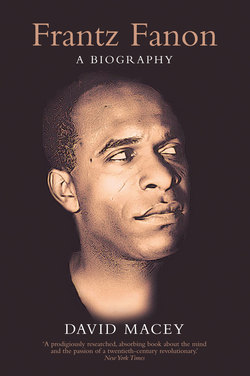Frantz Fanon

Реклама. ООО «ЛитРес», ИНН: 7719571260.
Оглавление
David Macey. Frantz Fanon
Отрывок из книги
Frantz Fanon
A Biography
.....
‘Refusal’ [refus] was the title of Maschino’s autobiographical account of his desertion. Another deserter was quick to identify with Nizan, and explains why one of the tiny groups that actively supported the FLN by channelling its funds across the Swiss border took the name ‘The Nizan Group’: Nizan was ‘the name of Sartre’s friend, who had just been republished by Maspero. He said there was only one solution: betray the traitors.’78 Fanon never read Nizan’s words, but there is an almost uncanny similarity between Nizan’s call for the betrayal of the traitors and Fanon’s insistence in Les Damnés de la terre that the ‘national bourgeoisie’ must betray its own interests to remain true to the revolution. Nizan and Fanon briefly fused into a composite icon of total revolt.79 Significantly, both were published by François Maspero, whose young publishing house was, like the older Editions de Minuit, becoming a focus for opposition to the war. Maspero explains his decision to publish them as stemming from his early conviction that the colonial wars in Indochina and then North Africa were intolerable, and from his disillusionment with the orthodox left: ‘Nizan’s radical critique was directed against both the bourgeoisie (the same bourgeoisie that was sending us to fight in an unjust war) and what communism had become.’80
In France, the composite figure of Fanon–Nizan came to signify total revolt against French society and the PCF. For a tiny minority, Fanon also inspired a positive commitment to Algeria. Few young French people actually went to Algeria after the war, but Fanon was their inspiration. They read Fanon’s L’An V de la révolution algérienne and Les Damnés de la terre and were inspired to go along with the young Algerian republic as it took its first steps into what they thought was the socialist future.81 Juliette Minces, who went to Algiers to work on the Third Worldist journal Révolution africaine, describes in the preface to a collection of reprinted articles from that journal how a reading of Fanon inspired the conviction that Algeria’s long struggle for independence would inevitably produce a socialism that would work to the advantage of the wretched of the earth, and especially women and the poor peasantry. She also has to admit that this ‘lyrical enthusiasm’ was short-lived,82 as Algeria rapidly became mired in corruption and bureaucracy. As Maschino and his Algerian wife put it, their revolution had been confiscated.83 The promised liberation of the women of Algeria had not come about.84 On their return to France, these young people were dubbed ‘pieds rouges’ – a cruel pun on pieds noirs, the term used to designate the French population of Algeria, and particularly the defenders of French Algeria who finally fled when the prospect of independence offered them a grim choice between the suitcase or the coffin.
.....